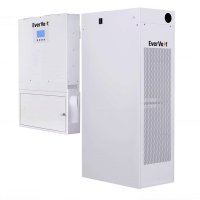
A solar purchase is a big investment and a smart one for homeowners. Adding energy storage can turn that smart decision into a brilliant one with plentiful backup power, larger savings, and a bigger return on their solar investment year after year. But with so many options to choose from, how do you know you’re recommending the right solution to your customers?
Battery storage has become a popular option for homeowners looking to add emergency backup, store their solar energy for use at night time, or save money in areas with time-of-use rates. “But as an emerging renewable technology, there is a lot of misinformation and confusion among installers and homeowners,” says Dan Glaser, a senior sales engineer at Panasonic. “Our goal is to educate on the capabilities of battery storage systems and provide a flexible solution that our installers can adapt to any project.”
One of the first decisions is whether to buy an AC or DC battery.
Since AC is better than DC for long-distance transmission, the power grid and all homes in the US use AC power. However, solar panels produce DC power. That's also how most batteries store power. Thus, before you can use any electricity from your panels or battery, it needs to be converted into useable AC power.
Panasonic’s new EverVolt™ battery storage systems are available in both AC and DC coupled versions to meet the demand of practically any residential energy storage application, with or without solar.
A backup to the backup
Is generator integration necessary for a home battery system?
As energy storage adoption rates continue to rise, a common question among homeowners is: "how long will my batteries last?". Similar to your cell phone, laptop, or electric vehicle, the answer depends on a variety of factors.
The amount of power batteries provide depends on their capacity. While you can install a system to power a whole home over a given period, it's more common for home batteries to backup only the most essential appliances for a longer time.
“A single EverVolt™ battery can run most 120V appliances in the average home for six to nine hours on a full charge,” says Glaser. “And you can monitor your battery’s state of charge during an outage from your phone through the EverVolt app.”
Unlike many gas generators, a home battery will automatically disconnect itself from the grid and start running as soon as the grid goes down. The process is seamless. You probably won't notice it is happening and it will operate quietly in the background without emitting polluting fumes. It happens so fast that clocks and other electronics will not need to be reset.
What if a single EverVolt system won’t meet your backup needs?
“A dual or triple stacked EverVolt system can provide additional power for surge loads like well pumps and air conditioning units,” Glaser says. The benefit to the homeowner is longer duration battery life during a power outage and increased off-grid autonomy.
However, there are certain situations where a backup generator may be preferred to provide an added layer of resiliency to a battery storage system. Integrating a backup generator can be thought of as a backup to the backup, which may be desired in situations such as:
- Smaller PV systems that can’t fully recharge home batteries on a daily basis
- Northern latitudes where the sun is lower in the sky during winter months, and may not provide sufficient energy to fully recharge the batteries daily
- Locations susceptible to long grid outages due to natural disasters
If a home fits any of these categories, or the homeowner wants a backup generator for added peace of mind, there are two primary ways the EverVolt system can accomplish this:
1. Backup to the backup: A generator would be configured to automatically turn on and power essential loads in the rare instance your EverVolt battery reaches a 10% state of charge (SOC). Once the grid returns, or the sun comes up and your PV system provides energy, the generator would be turned off.
2. Charge batteries: In this configuration, a backup generator will be configured similar to the above configuration, with the added benefit that the generator could also be used to recharge the batteries. This would be a slightly more expensive option than #1 above.
Glaser also cautions that the generator integration feature should only be used if necessary. There can be implications to certain local and federal incentives if the batteries are charged too often from non-renewable sources.
New opportunities for qualified installers to increase sales
Even during this abnormal year, the solar industry continues to grow. Due to factors such as an unstable power grid, increasing occurrences of damage-causing weather events, wildfires, and general public uncertainty, energy storage is one of the fastest growing segments in the renewable space. That means opportunities abound for solar installers and electrical contractors to grow their business in the residential renewable energy market.
Panasonic’s EverVolt™ Certified Installer program enables solar professionals to expand their service offerings and business by meeting the current market demand for storage. Upon completing virtual classroom training, testing, and demonstrating installation know-how in the field, installers become EverVolt Certified. “EverVolt certification is a differentiator and a great way to grow your business quickly,” says Glaser.
--------------------------------------------------------------------------------------------------------------------------------
EverVolt™ energy storage provides a complete home battery system manufactured and warrantied by one of the world’s first battery pioneers. With EverVolt, the same high-performing battery technology that powers the world’s fastest electric cars is now available to power your home.
--------------------------------------------------------------------------------------------------------------------------------
Dan Glaser is a senior sales engineer with Panasonic Life Solutions and offers more than a decade of solar expertise and renewable energy thought leadership to the industry.
